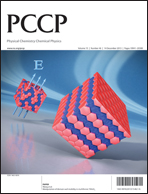Selective DMSO-induced conformational changes in proteins from Raman optical activity†
Abstract
The function of a protein is determined by its structure, which is intrinsically related to its solvent environment. Based on this paradigm, there has been a great deal of interest in the role that non-aqueous solvents play in regulating protein structure, with some debate in the literature regarding dimethyl sulfoxide (DMSO). Thus, in this work we have used Raman and Raman optical activity (ROA) spectroscopies to investigate conclusively the changes induced by DMSO in the secondary structure of an array of proteins including human serum albumin (highly α-helical), bovine α-lactalbumin (mainly α-helical), bovine ribonuclease A (containing both α-helix and β-sheet), bovine β-lactoglobulin (mainly β-sheet), and bovine α-casein (disordered). Our results clearly demonstrate that 100% DMSO solutions destabilize α-helices completely, converting them into the poly(L-proline) II (PPII) helix conformation. However, low concentrations of DMSO (10% v/v) were found to have little effect on the structure of even the most helical protein, human serum albumin. In the case of α-casein, the natively unfolded protein rich in PPII helix was converted into a further disordered structure when dissolved in pure DMSO. By contrast, β-sheets remained mostly unaffected regardless of DMSO concentration. While providing new insights into protein structure in organic solvents, this work reinforces the capability of vibrational optical activity to assess conformations of biomolecules in conditions not accessible to other techniques, such as X-ray crystallography and NMR.


 Please wait while we load your content...
Please wait while we load your content...